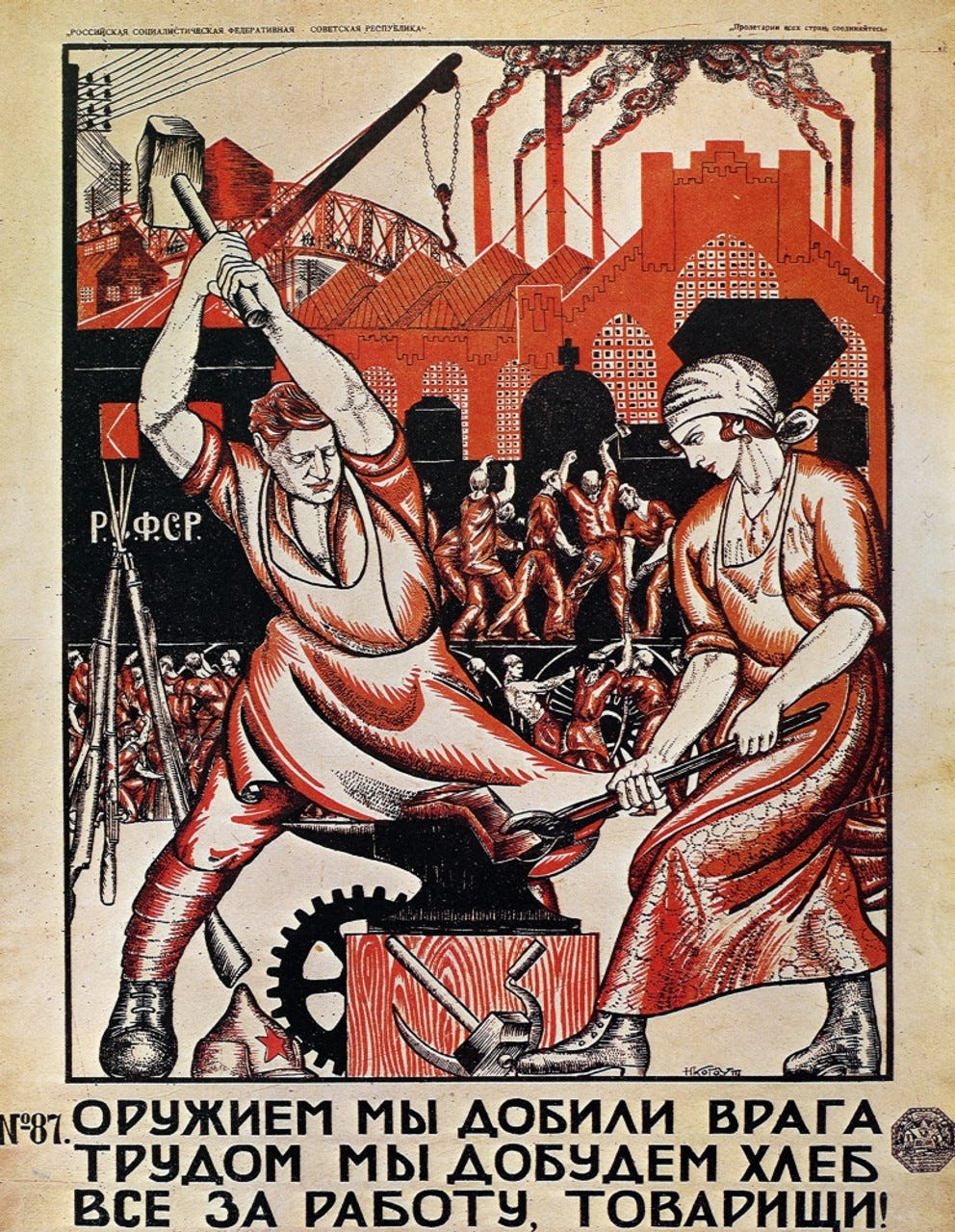The Left is a Labor Movement, the Left is a Worker's Movement
"antiwork" is inherently and existentially incompatible with our goals
Several of you sent me this piece about how work is the great “American scam” by Tim Kreider at the NYT, and I get asked about the antiwork thing all the time. My response to that whole suite of ostensibly-left political agitation is always the same: have you people never seen a piece of 20th-century leftist iconography in your lives? Valorizing work, dignifying it, investing it with value, insisting that the man at the bottom who sweats in the heat of a foundry is nobler than the man in a suit that sits on top of the heap and counts the money - this has been the lifeblood of left movements for centuries. I find it profoundly weird that so many people seem to think that the left is opposed to the very concept of productive labor, especially given our belief that the worker’s control over his own labor is ultimately the only tool we have to fight oppression. The left has put work on a pedestal both out of intrinsic appreciation for the value of productivity and also because work is our greatest strength.
To be clear, there are people who call themselves antiwork who want only to make work fairer or safer or less burdensome, and of course I’m on board with that. But as Trace Underwood meticulously documented, the popularization of antiwork was built in large measure by people who really are explicitly opposed to labor in and of itself. And I think that’s bad. Which kind of antiwork person is Kreider? I’m not entirely sure. He suggests laziness is bad and that there are some productive purposes that he finds valuable. But his manifesto (his word) is generally aligned with the vision of a post-capitalist future where nobody ever has to do work. And I just don’t understand how such a society functions. Somebody still has to keep the sewage system working, even after the revolution.
There may be a future in store where technology is so powerful that most of us won't have to work most of the time. But that's too distant a dream to let color our analysis today.
Kreider praises idleness, and I’m actually in agreement there. Being idle can be a wonderful thing and everybody should get to experience it sometimes. Our goals absolutely should include shorter work weeks and more vacation. There’s a great book called How to Be Idle that lovingly documents the virtues of doing nothing. And it happens that, in my preferred future, society is willing to tolerate a few freeloaders as an inherent cost of being more humane, so maybe Kreider and Tom Hodgkinson can do nothing and get away with it. There are worse problems for society. But most people will always work because our communities require it to function and because most people in fact have a deep need to be productive and want to devote their days to socially-useful projects. What we want is to free them from the tyranny of exploitative bosses and the vagaries of fate that can leave them penniless under capitalism. Indeed, one of the most exciting aspects of a socialist future is that once people are free from having to labor in bad jobs that don’t make them safe, their productive capacities will in fact be unleashed for the betterment of society. We can build a future that frees people from the vagaries of our current system of work while unlocking new reserves of productivity.
Progressives want work to be more remunerative and to take place under better conditions. Socialists want workers to labor in industries where there is partial or total state ownership of said industries. Marxists want to end the exploitation of wage slavery inherent to trading work for money that must by the very nature of the profit motive be of lesser value than the value workers created. These are all worth fighting for. But the left is about work, it always has been, and if we were to give that up, I have no idea what we’d stand for or what power we would have.



I really soured on the related idea of "fully automated luxury communism" when I thought more deeply about the fact that labor is the primary relationship between human beings and the non-human environment (an idea that's latent in some of Marx's writings, if not explicit). If we automate away that social relationship, we basically guarantee that very few people have a meaningful understanding of the impact their actions have on the environment. They might use their leisure time to go on hikes or grow vegetables, but almost definitionally they won't be doing so at a scale that actually supports meaningful levels of consumption, and thus the relationship between the machinery that supports their lives and the natural world remains obscure.
Also, automating everything so that we can live Eloi-like lives of pastoral idleness seems like a great way of ordaining a priestly caste of technicians in charge of the machinery that supports everyone. And thus society itself in the long run. As socialists we're often fond of pointing out that wealth makes people lazy, disconnected, and disdainful of their fellow human beings. Why we'd want to universalize that no longer makes any sense to me.
As a banker I’ll always be able to sleep easy while supposed “leftist” politicians and activist refer to the the actual muscle of their movement as “deplorable”.
How many online “leftist” perform manual labor for work? Or are even friends/relatives of people who perform manual labor for work?